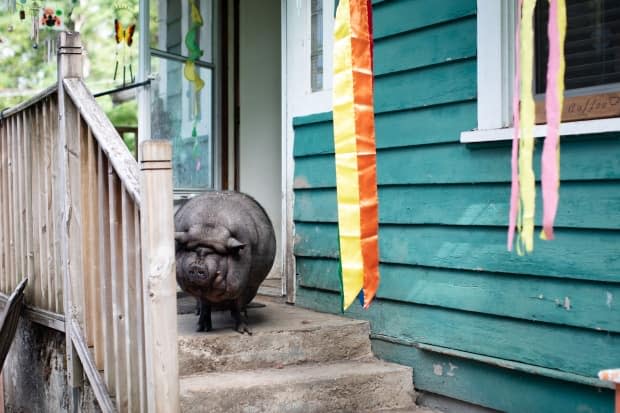Pet 'mini-pigs' are outgrowing owners' expectations — and sanctuaries are running out of space to re-home them
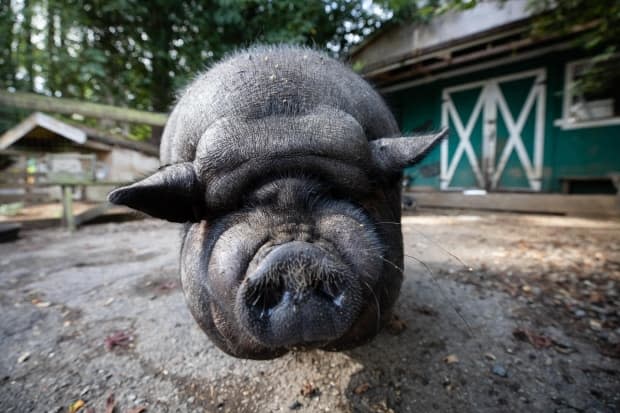
In one of Carrie Shogan's treasured videos, she can be seen cheering on one of her rescued pigs as it rolls in mud for the first time.
The star of that clip, called Strawberry, had rarely been outside before he arrived at the Little Oink Bank Sanctuary in Oliver, B.C., three years ago, Shogan recalls. He had previously lived in a townhouse, kept there illegally as a pet by his owners.
Another of the rescued pigs at Shogan's sanctuary was kept in a condo in Vancouver. Like other people who buy pigs as pets, its owners hoped their animal would become an Instagram star.
Across social media, images abound of dainty "mini-pigs" posing with their owners. That's causing problems because not only is it illegal to keep pigs as pets in many B.C. municipalities, but many of their owners also find they're unable to care for the animals — often unaware they can grow far bigger than their marketed "mini" size.
"People just kind of glorify how cute these little animals are, dressing them up when they're tiny and they look adorable, but these are going to turn into big animals," said Michelle Singleton, who runs A Home for Hooves Farm Sanctuary Foundation in Duncan, B.C.
"You're looking at an easy 150, 200 pounds."
Faced with the challenges of care and potential fines in municipalities where pet pigs aren't allowed, some owners are scrambling to find new homes for their pigs — leaving sanctuaries inundated with the animals.
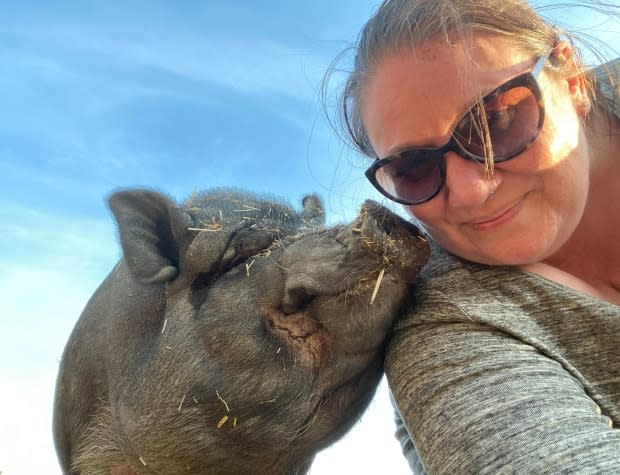
Singleton said she had to turn away 30 pigs this year. Shogan, whose sanctuary is full with 58 pigs, said she recently had to turn away 12 re-homing requests in a week.
Re-homing pigs is difficult, according to the sanctuaries that spoke with CBC News. They said when they accept pigs, almost all of them stay at the sanctuary until they die.
A forever home is essential to restore the animal's trust and give them stability because they are highly intelligent, emotional and family-focused animals, Singleton said. With the attachments they form and their large size, it can be extremely difficult to find new families for them.
People Ensuring Animal Care Exists (PEACE), a charity that works with farm sanctuaries in Western Canada to help rehome and transport animals, says it can't keep up with rehoming requests from people looking to give up their pet pig.
Around 40 pigs are currently on a wait list, mainly for B.C., that PEACE started last year.
"If we could find homes for every mini-pig rehoming request, we'd be in the hundreds by now," PEACE executive director Sarien Slabbert told CBC News.
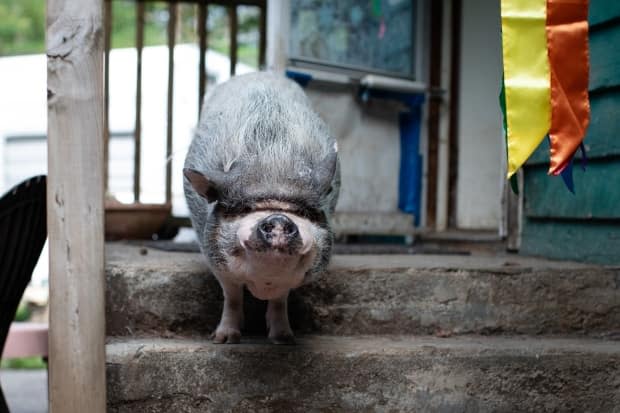
What is a mini-pig?
"Mini-pig" is a term used to describe any smaller pig, as opposed to a specific breed. They include varieties that have been selectively bred to be smaller in size, such as KuneKune, Yucatan and pot-bellied, according to Kristen Jakub, a farm animal welfare specialist with the B.C. SPCA.
The animals are also marketed as "micro-pigs," "pocket pigs" and "teacup pigs," and these labels are often where potential buyers get misled, said Jakub.
The American Mini Pigs Association (AMPA) says a standard mini-pig can weigh between 50 and 150 pounds, but any breed of pig under 350 pounds is considered to be a "miniature pig."
Breeders charge anywhere from a few hundred dollars to several thousand.
The B.C. SPCA says breeders in Canada can be approved by AMPA, a group comprised of registered mini-pig breeders who agree to a code of ethics.
But Jakub says there are breeders across the country who are not registered and may not be following the AMPA code — and this is where a lot of buyers end up getting a pig that may not be as small as advertised.
The outlook for pigs that can't be re-homed is bleak, sanctuary owners say.
"I have a pig here — if I didn't take her, [the owners] were going to shoot her," Singleton said.
Janice Gillett, whose Hearts on Noses Sanctuary in Mission, B.C., is full with 35 pigs, says she's aware that pet pigs are "getting slaughtered every week."
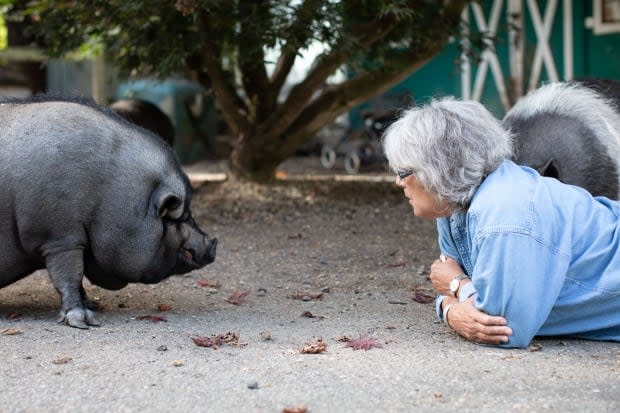
Know your bylaws
Even for pigs that find a new home, the stress of relocating can be too much.
Chilliwack, B.C., resident Eli Gagne said he had a week to find a new home for his mini-pig or face a fine of $100 per day after a neighbour complained to the city.
Gagne said he wasn't aware that district bylaws prohibited keeping pigs as pets, and believed it wouldn't be an issue because he lives near farmland.
He says he found a new home for his pig, named Hamson, at a farm near Kelowna, B.C. — but the animal died just four hours after arriving.
Gagne believes Hamson died from the stress of having to change homes.
"It's just an unnecessary death," Gagne said, adding that Hamson was considered part of his family with his partner and two children.
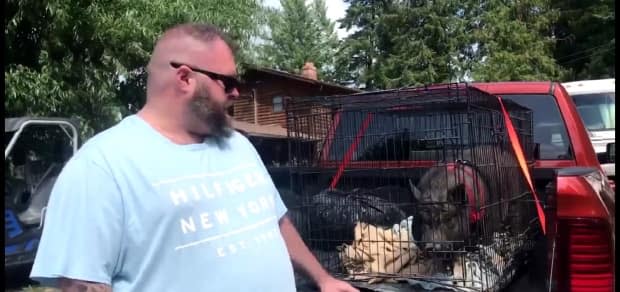
Bylaws on keeping domesticated pigs differ by municipality. For example, in Vancouver, there is a ban on keeping any type of swine as a pet. But in Vernon, mini-pigs are considered companion animals like dogs or cats.
Gagne now hopes to launch a petition to change the Fraser Valley Regional District's bylaws so people can keep pigs as pets and not just as livestock.
But he strongly advises people hoping to become owners of a pet pig to do their homework first. That means knowing the local laws and the particular needs of your pig.
Shogan echoes the importance of research and commitment for aspiring pig owners.
"Are you zoned for pigs? If you're renting, is your landlord OK with you having pigs? ... Then you need to find out about the specific behavioural needs and the medical needs," she said.
"The pigs that are here, they're our family... we wouldn't trade them for anything. But what we would really love is [for our sanctuary] to not be in existence," she added.
